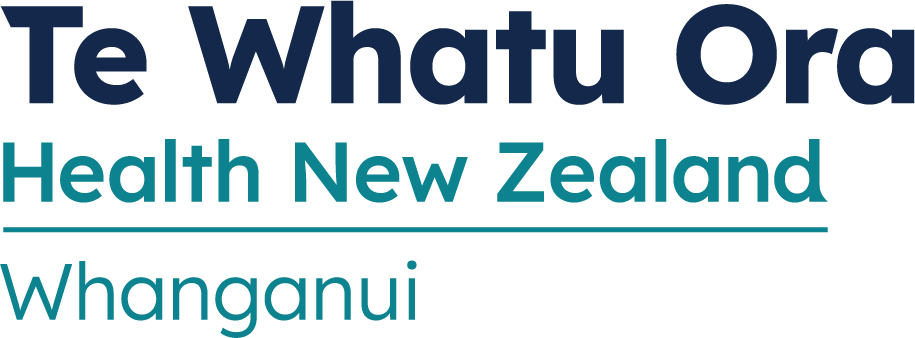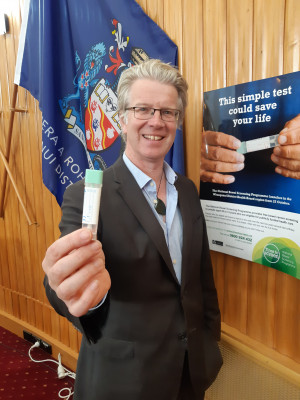
17 October 2019

Whanganui mayor Hamish McDouall with a bowel screening tester is happy to support the kaupapa.
Whanganui mayor Hamish McDouall remembers his friend from university days in Otago as being “fit and a talented footballer who loved music”.
The friend became unwell and in some pain – “He thought it was an ulcer”.
It wasn’t an ulcer, it was bowel cancer and the friend – fit and healthy – died.
That memory is just one reason why McDouall is getting behind the free National Bowel Screening Programme which is being launched in Whanganui on October 22.
Whanganui will get free screening for men and women aged 60 to 74 years who are eligible for publicly funded healthcare – and any follow-up tests or treatment will also be free.
McDouall is delighted the national programme has reached the River City where it is estimated it could save as many as 25 lives in its first two years. And he is encouraging everyone who receives a test kit in the post to participate.
He has another connection to the programme as his best friend Matthew is the son of gastroenterologist Susan Parry, the clinical director for the National Bowel Screening Programme.
“I know Susan very well, and I know she has done some wonderful work and is very passionate about this programme. She is also extremely humble, but this is an amazing thing that will save lives.”
The programme started in July 2017 with Hutt Valley and Wairarapa the first district health boards involved. Once the national programme is fully implemented, more than 700,000 people aged between 60 and 74 years will be invited to take part in the screening programme every two years.
For every 1000 people who are screened, it is estimated about 50 will be positive, and approximately 500 to 700 cancers each year are expected to be detected once the programme is fully rolled out.
It is anticipated that 25 cases of bowel cancer will be identified in the first two years of the Whanganui DHB screening programme, and that many of these will be in the early stage.
There may be no warning signs that a person has bowel cancer, and screening every two years can save lives by helping find the cancer early when it can often be successfully treated. People who are diagnosed with early stage bowel cancer, and who receive treatment early, have a 90 per cent chance of long-term survival.
New Zealand has one of the highest rates of bowel cancer in the world, with more than 1200 dying from the disease each year.
Bowel cancer is more common in those aged over 60, and more common in men than women. Common symptoms include a change to your normal bowel habit that continues for several weeks, and blood in your bowel motion.
The free screening test is quick, clean and simple to do by yourself at home.
All those eligible will be sent an invitation letter, a consent form and a free bowel screening test kit through the mail within two years of the programme starting in Whanganui.
The test, which should be returned by post, can detect tiny traces of blood present in a small sample of your bowel motion (poo). A positive test result does not necessarily mean cancer is present – it could be another minor condition.
A positive test means that further investigation is required and this will usually be a colonoscopy (an internal examination of the large bowel).
A negative result means that no further investigation is needed but it is important to note the screening test detects blood in the bowel motion, and some cancers do not bleed all the time.
Also, bowel cancer may start to develop between screening tests and that is why regular screening is important and participants will be invited for screening every two years while they are eligible.
Further information about the National Bowel Screening Programme is available at
www.timetoscreen.nz or by calling 0800 924 432.



